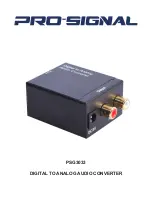
USB 3.1 Type C to Dual
Display Converter
User Manual
English
Benutzerhandbuch
Deutsch
Manuel Utilisateur
Français
Manuale
Italiano
Hersteller / Manufacturer (EU):
Manufacturer (UK):
LINDY-Elektronik GmbH
LINDY Electronics Ltd.
Markircher Str. 20
Sadler Forster Way
68229 Mannheim
Stockton-on-Tees, TS17 9JY
Germany
England
Email: [email protected] ,
T: +49 (0)621 470050
T: +44 (0) 1642 754000
No. 43304
lindy.com
© LINDY Group - FIRST EDITION (March 2020)
User Manual
English
Benutzerhandbuch
Deutsch
Introduction
Thank you for purchasing the USB 3.1 Type C to Dual Display
Converter. This product has been designed to provide trouble
free, reliable operation. It benefits from both a LINDY 2 year
warranty and free lifetime technical support. To ensure correct
use, please read this manual carefully and retain it for future
reference.
This USB 3.1 Type C to Dual Display Converter allows you to
operate two independent displays from a single desktop or
notebook video output.
Please Note:
A USB 3.1 Type C port with support for DisplayPort
Alternate Mode is required.
Package Contents
•
Lindy USB 3.1 Type C to Dual Display Converter
•
This manual
Features
•
Compatible with all USB Type C/Thunderbolt 3 equipped
computers with DisplayPort Alternate Mode
•
Input: USB 3.1 Type C male
•
Outputs: HDMI A and DisplayPort female
•
AMD Eyefinity and Intel Collage compatible
•
Max. resolutions: 3840 x 2160@60Hz or 3840 x
2160@30Hz for 2 monitors simultaneously
•
Supports audio over 192kHz 16-24bit/sample, up to 7.1
Channel
•
HDCP 1.3 compliant
•
Chipset: STDP4320
Installation
The DisplayPort Alternate Mode on the USB Type C connector
standard uses the USB C connector as a video output without the
need for additional drivers or software.
To begin using the converter simply connect the USB 3.1 Type C
connector of the converter to the USB 3.1 Type C port of your
computer and the HDMI and DisplayPort sockets of the converter
to the corresponding connectors of your displays using an
appropriate male to male cable (not included).
The connected monitors can either use the same video signal
(mirror mode), different signals (extended mode) or share a
signal across both displays (collage mode), these parameters are
set via the operating system.
Tested to comply with
FCC Standards
For Home and Office Use!
Einführung
Wir freuen uns, dass Ihre Wahl auf ein LINDY-Produkt gefallen
ist und danken Ihnen für Ihr Vertrauen. Sie können sich
jederzeit auf unsere Produkte und einen guten Service
verlassen. Dieser USB 3.1 Typ C auf Dual Display Konverter
unterliegt einer 2-Jahres LINDY Herstellergarantie und
lebenslangem kostenlosen, technischen Support. Bitte lesen
Sie diese Anleitung sorgfältig und bewahren Sie sie auf.
Dieser USB 3.1 Typ C auf Dual Display Konverter ermöglicht
die
Ausgabe
des
Videosignals
auf
zwei
Monitore.
Voraussetzung ist ein Computer mit DisplayPort-Alternate -
Mode-Unterstützung.
Lieferumfang
•
Lindy USB 3.1 Typ C auf Dual Display Konverter
•
Dieses Handbuch
Eigenschaften
•
Kompatibel mit allen Computern mit USB Typ C- oder
Thunderbolt 3-Anschluss mit DisplayPort Alternate Mode
•
Eingang: USB 3.1 Typ C Stecker
•
Ausgänge: HDMI A und DisplayPort Buchse
•
Kompatibel mit AMD Eyefinity und Intel Collage
•
Maximale Auflösung: 3840 x 2160@60Hz oder 3840 x
2160@30Hz für 2 Monitore simultan
•
Unterstützt Audio über 192kHz 16-24bit Sample-Rate bis
7.1-Kanal
•
Kompatibel mit HDCP 1.3
•
Chipsatz: STDP4320
Installation
Der DisplayPort Alternate Mode verwendet den USB Typ C
Anschluss als Videoausgang, eine Installation von Treibern ist
daher nicht erforderlich.
Stecken Sie den USB 3.1 Typ C Stecker des Konverters in die
USB 3.1 Typ C Buchse Ihres Computers und verbinden Sie den
HDMI und DisplayPort Port des Konverters mit denen Ihrer
Displays. Dazu benötigen Sie je ein Monitorkabel Stecker
–
Stecker (nicht enthalten), welches im Allgemeinen dem Monitor
beiliegt.
Die Bildschirme können das gleiche Bildsignal (Mirror Mode)
oder unterschiedliche Bildsignale (erweiterter Desktop)
anzeigen. Die Einstellung erfolgt über das Betriebssystem.




















